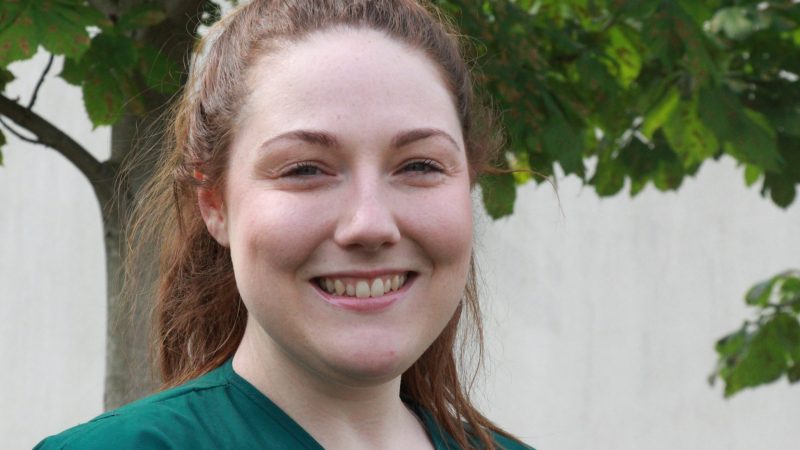
“I don’t want any new mum who is struggling with breastfeeding to feel like a failure” – that’s driving force behind one local woman’s career move from customer services to midwifery assistant.
After giving birth two and half years ago, Sophie Simpson struggled to breastfeed her baby boy Arlo. Refusing to give up, Sophie asked her North Tees and Hartlepool NHS Foundation Trust maternity team for help with breastfeeding. A short but intensive period of advice and training followed, resulting in the new mum being able to feed her new arrival.
Sophie, 30, from Stockton-on-Tees, subsequently left her job with a bank and joined our Trust as a midwifery assistant. It came after she was inspired by the care provided by the maternity team.
Sophie’s story
Sophie said: “I had Arlo at home and I just thought breastfeeding would come naturally, but it didn’t. I couldn’t get him to latch on or if he did, it was very painful for me.
“The midwifery team arranged for me to spend a couple of days at hospital. They gave me so much advice and support that I was able to properly feed Arlo.
“After that, I went to my local midwifery community hub which was a huge help. As were the regular visits from my own midwife to make sure I was still managing to feed Arlo.”
The experience led Sophie, who already held a foundation degree in health and social care, to apply to work for the very team which had supported her so well. She commented: “My mum found the job specification online. It was everything I wanted and I met every criteria.
“I’ve been here for ten months now and I just love it. I even worked with my own community midwife for a while which was lovely.
“The best part of my job is helping a new family transition into parenthood. It’s just so rewarding, but I don’t want any new mum who is struggling to breastfeed to feel like a failure. We’re always here to help.”
As part of National Breastfeeding Week (Monday 27 June to Sunday 3 July), Sophie and the North Tees and Hartlepool NHS Foundation Trust maternity teams are hosting special displays and offering regular ‘top tips’ for breastfeeding on the Trust’s social media accounts.
Why breastfeeding matters and how we can help
Why breastfeeding matters and how we can help
I’m going to tell you about breastfeeding and why it’s important for you and your baby.
There’s loads of health benefits for both mum and baby with breastfeeding, such as reducing mum’s chances of certain ovarian cancers and breast cancers in later life.
It’s good for baby because it’s packed full of antibodies. And it’s got all of that goodness in there for baby and it’s perfectly designed for them.
It’s convenient and it’s ready when baby’s ready.
When you are pregnant, there’s a group that we run in the community for breastfeeding support so you can come to that and learn how to get off to a good start.
And then once baby’s here, we’ve got lots of support available as well through myself and the other community midwifery assistants.
We can come and help you with that position and attachment and make sure that you and your baby are both enjoying that journey together
Top tips for breastfeeding:
- Breast milk is a living substance that contains live cells, including stem cells, which go on to become other body cell types like brain, heart, kidney, or bone tissue.
- Breast milk contains antibodies and live white blood cells that help your baby fight against infection. And, if you or your baby are ill, the amount of these cells in your breast milk increases.
- Breastfeeding can be convenient – it’s ready made to the right temperature, in the right portions wherever and whenever your baby needs it…and its free!
- You can’t give your baby too much breastmilk. All breastmilk is amazing for your baby, by feeding responsively you can ensure your baby is getting the right amount for them.
- Your baby doesn’t need formula before your milk comes in. Your body produces colostrum which is a concentrated thicker type of milk that’s packed full of antibodies and antioxidants.
- The law states you can breastfeed in public anywhere, including restaurants and parks.

